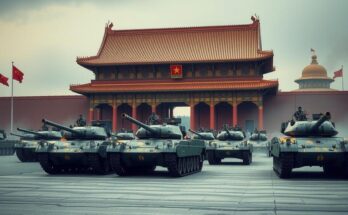The SADC has decided on a phased withdrawal of troops from the DRC following heavy losses this year. The decision was made during a virtual summit amid ongoing conflict with the M23 rebel group. As peace talks are set to begin next week, the DRC faces scrutiny over its handling of the crisis, while implications regarding Rwanda’s support for the rebels persist.
The Southern African Development Community (SADC) has initiated a phased withdrawal of its troops from the Democratic Republic of the Congo (DRC), following significant losses this year. During a recent virtual summit, leaders from the 16-nation bloc deliberated on the ongoing conflict in the eastern DRC, an area plagued by unrest for thirty years. The mission, known as SAMIDRC, will be terminated, with an official communique stating the commencement of troop withdrawal.
The resurgence of the M23 rebel group has led to significant territorial gains in the mineral-rich eastern DRC, with critical cities like Goma and Bukavu under their control since January. The Congolese government has reported at least 7,000 fatalities in the region due to the conflict. The SADC mission, which includes a substantial contingent from South Africa, had suffered casualties with 14 soldiers lost in January alone.
SADC Chairperson and Zimbabwean President, Emmerson Mnangagwa, emphasized the necessity for an urgent resolution to the conflict at the summit. He highlighted the importance of inclusive dialogue and deemed the review of the DRC’s situation as timely. Meanwhile, Angola has announced that direct talks between the DRC and the M23 will commence on March 18. This represents a shift for Congolese President Felix Tshisekedi, who previously resisted dialogue with the rebels.
While the Congolese government is considering Angola’s mediation proposal seriously, it is unclear how long these negotiations will last. Reports indicate that any direct discussions with M23 do not absolve Rwanda of its alleged support for the rebels. The withdrawal of SADC troops poses a challenge for President Tshisekedi, who is already under scrutiny for his management of the ongoing crisis. Rwanda’s Foreign Minister expressed support for the troop withdrawal, claiming it would aid in restoring peace in the region, despite accusations of Rwandan involvement with the M23.
The SADC’s decision to withdraw troops from the DRC marks a significant shift in regional involvement amid ongoing conflict with the M23 rebel group. With the loss of lives and territory to the rebels, the upcoming peace talks mediated by Angola will be crucial. The shift in dialogue, despite previous refusals, could open pathways to a resolution, although concerns remain regarding the implications for government leadership and Rwanda’s alleged involvement with the rebels.
Original Source: www.aljazeera.com




